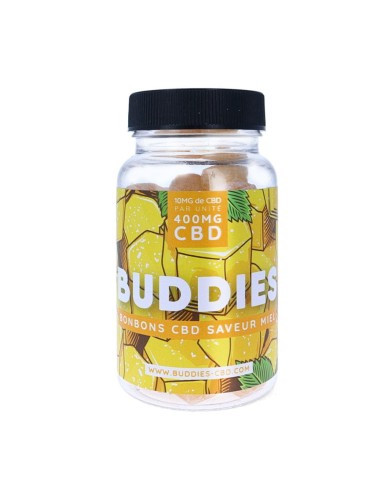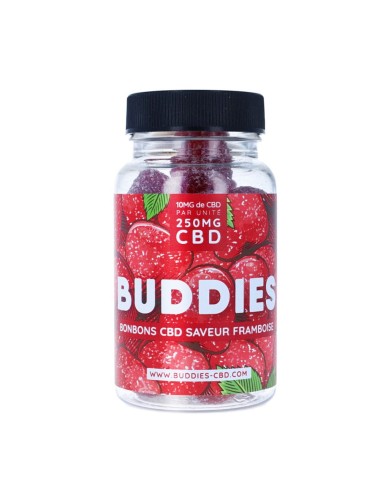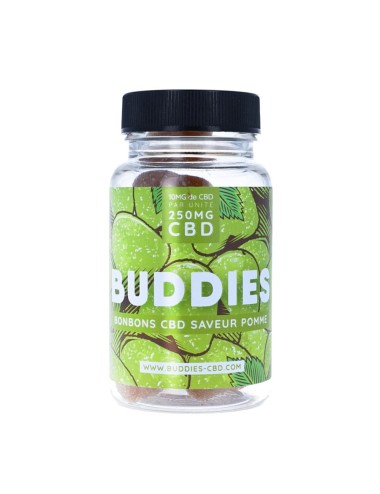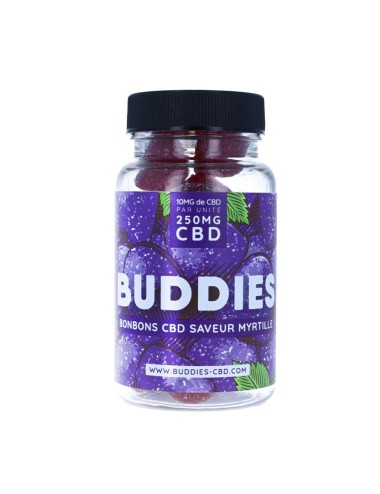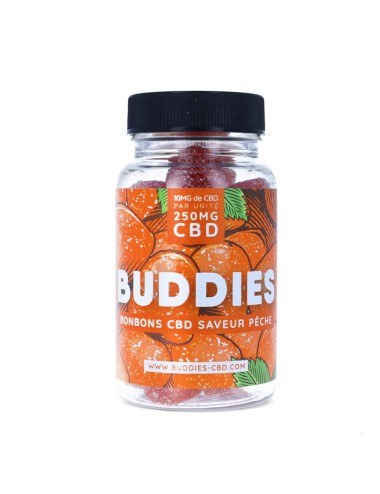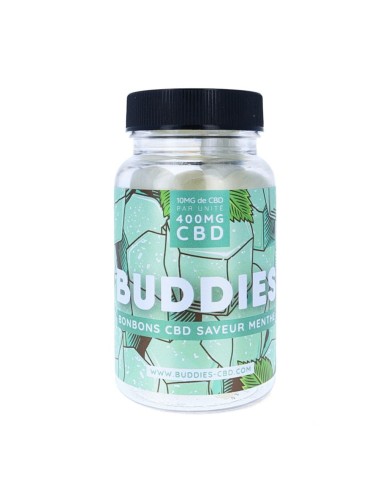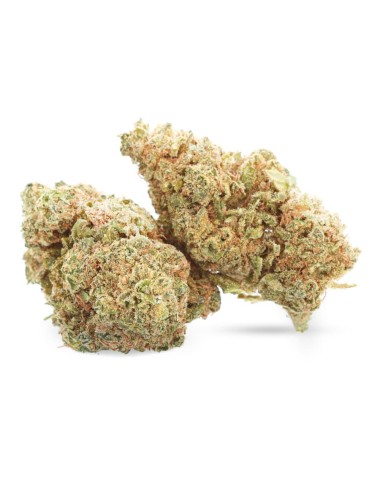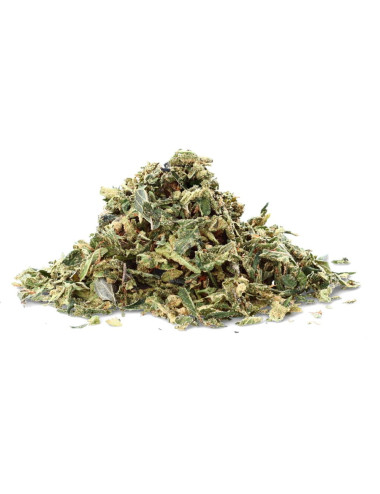Therapeutic effects of CBD: All you need to know
Cannabidiol, more commonly known as CBD, is a compound extracted from hemp that has gained in popularity in recent years. The health benefits of this molecule have been widely studied, and it is credited with actions on the brain with positive and therapeutic effects. In this article, we'll take a look at how CBD acts on our bodies and what the main recommended uses are in order to reap its full benefits.
Top 6 effects and benefits of cannabidiol (CBD)
Recognized for its many properties that have a positive effect on our bodies, CBD is legally consumable as long as it contains less than 0.3% THC.
The effects of CBD (cannabidiol) are attracting more and more consumers, especially as CBD has no psychoactive effects and is not addictive. In France, although the cultivation of cannabis and its consumption in general are prohibited, there is no law forbidding the consumption of CBD.
As a result, the number of derivative products on the market is multiplying, and that's all to the good. However, it is sometimes difficult for (future) consumers to distinguish between what they hear here and there and the real opportunities offered by cannabinoids in general, and CBD in particular, in terms of benefits.
Especially as scientific study after scientific study continues to demonstrate the effects of cannabidiol on our bodies, but most European governments continue not to recognize therapeutic cannabis.
The Weedy.fr team takes a look at what we know about the effects of CBD... and what's yet to be discovered!
What is CBD?
Cannabidiol, also known as CBD in France, is a natural chemical substance derived from the cannabis flower. CBD is the cannabinoid most present in the plant, after tetrahydrocannabinol (THC).
Although closely related to THC, it is known not to reproduce the latter's unwanted effects, such as anxiety or addiction. Even if it's not illegal to consume it, the sale of products containing CBD remains highly regulated. Only certain varieties of hemp are authorized, and only certain parts of the plant can be used.
Above all, THC content must be less than 0.3% to avoid illegal use.
CBD is marketed in various forms, depending on the legislation in force in the countries where it is consumed. Highly sought-after for the effects it brings, CBD is available as an extract, in CBD infusions, CBD oils, CBD cosmetics, CBD e-liquids for electronic cigarettes and even in food.
See also: Definition of CBD
Cannabis or hemp: different benefits?
Hemp is not only cultivated for its properties on the human body. It is also widely used in industries such as the automotive, textile, construction and cosmetics industries.
This use, far less problematic in the eyes of the French authorities, is partly due to the distinction made in the country between cannabis (grown for its cannabinoids and their effects) and industrial hemp (grown mainly for mulching, rope or fabric).
The strictness of French laws may seem paradoxical when you consider that hemp cultivation in France is more than profitable. The country is Europe's leading hemp producer, and the world's second largest, just behind China.
Top 6 effects and benefits of cannabidiol ?
The effects of CBD are recognized by scientists and doctors worldwide. It is a safe, non-addictive substance, which sets it apart from tetrahydrocannabinol. Both CBD and THC have important therapeutic properties.
But unlike THC, CBD's properties don't make you feel like you're in a psychic and physical second state. This is because the two components act differently on our body's receptors. CBD is even said to be able to attenuate the psychoactive effects of THC, depending on the quantities used.
Extensive scientific research, as well as growing testimonials from patients and doctors, highlight CBD's potential as a treatment for a wide range of illnesses.
A word of warning, however: the French government, like many others in Europe, does not recognize cannabis, or any of its cannabinoids, as a medical treatment. There is therefore no question of encouraging self-medication on the basis of the information presented here. If you are considering taking advantage of the potential effects of cannabidiol, we strongly recommend that you speak to a doctor beforehand.
That said, what are the main effects of CBD?
CBD effect no. 1: relieving chronic pain
CBD has anti-inflammatory and muscle-relaxing properties. This has the dual effect of both helping to reduce any inflammation present in the human body, and encouraging muscle relaxation. These two effects of cannabidiol complement and encourage each other, in what could be described as a virtuous circle.
CBD's action on the body can relieve certain types of pain, and even help to alleviate the long-term effects of chronic illnesses such as fibromyalgia or osteoarthritis, which is known to affect several million French people.
CBD may also limit inflammation of the brain and nervous system, which can provide relief for people suffering from pain, insomnia and certain immune system reactions. CBD may help relieve certain chronic pains
CBD effect n°2: Antidepressant properties
Anxiety and depression are pathologies that can affect us at many points in our lives. They disrupt our social life, our productivity and, above all, affect our health. Medicine has made it possible to develop drugs to reduce these pathologies, but not all of them are necessarily effective over the long term, not least because of the unwanted side-effects they can cause.
Short- and long-term side effects of the most common antidepressants include memory loss, mood swings, nausea and muscle pain.
Cannabis light is therefore sometimes used as an alternative to pharmaceutical products with severe side effects, as it remains in tune with the body's natural processes. By acting on our deep-rooted biological functioning, cannabidiol has the effect of relieving psychic disorders linked to mood, anxiety or depression.
With no known side-effects, it can be used to treat mild forms of depression, without fear of collateral damage from chemical substances.
CBD effect n°3: Soothes skin irritations
Also thanks to its anti-inflammatory properties, cannabidiol is increasingly used in creams and cosmetics for the treatment of skin disorders (acne, dermatitis and psoriasis in particular). In the fight against acne, for example, it would appear that cannabidiol, by acting on the CB2 sensors of our endocannabinoid system, can regulate excessive sebum secretion by the sebaceous glands, a major cause of the onset of acne attacks.
Although mostly benign, common skin diseases are particularly disturbing for those who suffer from them. This is true on a physical level (tightness, itching), but also on an aesthetic level (appearance of red patches, even long-term scarring). Once again, CBD creams and oils offer a natural and effective way to improve the daily lives of those suffering from skin problems.
CBD effect no. 4: Supporting neurological diseases
There are many neurological diseases, most of which are still extremely difficult to understand and treat. They include
- Neurodegenerative diseases: Alzheimer's (cognitive impairment), dementia, Parkinson's disease (affecting the central nervous system), epilepsy, stroke, Huntington's disease, multiple sclerosis.
- Neuropsychiatric disorders: autism, alcoholism, schizophrenia, OCD (obsessive-compulsive disorder), depression.
Of course, it's absolutely impossible to envisage treating all these illnesses in the same way, or even to suggest that CBD is an effective solution for all of them. Thanks to its soothing properties and its apparent ability to slow the aging of nerve cells, however, cannabidiol presents itself as a natural, side-effect-free way to help improve the daily lives of many patients suffering from disorders directly linked to the nervous and cerebral systems.
Another effect of cannabidiol is that German researchers have reported that hemp stimulates neurogenesis - the growth of new brain cells - in adult mammals.
CBD effect n°5: Relieves intestinal problems
Here again, studies are still at a relatively early stage. However, initial research has already looked at the role that CBD's properties could play in intestinal disorders such as Crohn's disease or irritable bowel syndrome (IBS).
Tips: To relieve intestinal problems, try our CBD Crumb Infusion Mix.
The link is not so difficult to establish, since more than two-thirds of our immune system is actually located in our gastrointestinal tract. Yet cannabinoids, and thus CBD, can directly interact with our nervous and cerebral systems. Once again, the anti-inflammatory and anti-nausea effects of CBD are an opportunity for the treatment of intestinal disorders.
CBD Effect #6: CBD and cancer treatment
Cannabidiol also has neuroprotective effects and anti-cancer properties, which are currently being studied in university research centers around the world.
According to a 2010 study of brain cancer conducted in California, scientists revealed that the effects of cannabidiol enhanced the inhibitory effects of THC against the proliferation and survival of tumor cells. CBD would therefore be much more effective in treating cancer, minus the negative consequences of tetrahydrocannabinol.
Another study, this time published in 2014, also presents encouraging results for breast cancer. The acid form of CBD, CBDA, was more specifically studied. Not yet tested on humans, but only in the laboratory, the association of CBDA with diseased cells appears to limit the spread of cancer cells.How does CBD work?
CBD, like THC, interacts with our bodies in a variety of ways. One of CBD's main effects is to mimic and enhance the effects of compounds in our bodies called "endogenous cannabinoids". They are so named because of their similarity to compounds found in the cannabis plant. These endocannabinoids are part of a regulatory system known as the endocannabinoid system.
The discovery of this system has dramatically improved our understanding of health and disease. It has major implications in almost every area of medical science, and helps explain how and why legal cannabis and THC are versatile compounds.
Acting on several levels in our bodies, this explains the widespread consumption of this mood-altering plant, despite its illicit status.
When should you take advantage of the benefits of CBD in oil form?
CBD oil has many advantages, prompting many regular users and newcomers to CBD to turn to it. It is :
- It's probably the easiest cannabis-derived product to use, thanks to clear dosage instructions on the packaging and, in most cases, a dropper bottle.
- Very easy to store and preserve, thanks to its easy-to-seal bottles for safekeeping.
- Gentler in its methods of use than more crude products such as CBD flowers or CBD pollens.
- Mellower in taste too, with the earthy, nutty notes typical of cannabis, which can easily be masked by placing the right number of drops on a sugar cube or directly in food.
In addition to these definite advantages, CBD oil also allows you to enjoy the effects of cannabidiol quickly, over a long period of time.
By opting for a broad-spectrum or full-spectrum oil rather than a CBD isolate, you can take advantage of the entourage effect, which allows you to benefit from all the cannabinoid effects present in the plant (with the exception of THC), and thus enjoy broader, more pronounced effects.
In particular, CBD oil is reputed to reduce the pain associated with arthritis. The result of its use by a sick person is a significant reduction in inflammation, and therefore, pain. Cannabidiol oil is also recommended for chronic pain.
Since there's no addiction phenomenon, it can be used over the long term without the need to increase doses. And, unlike tetrahydrocannabinol, there's no risk of dependency, so you can enjoy the full effects of CBD.
The impact of CBD on our brain
CBD is one of the many cannabinoids present in cannabis plants. Unlike THC, the plant's other active compound, CBD has no psychoactive effect, such as the euphoric high often associated with cannabis. In fact, its action on the body is mainly via its interaction with the endocannabinoid system, an important regulatory system whose main role is to maintain the balance (or homeostasis) between different biological functions.
The role of CB1 and CB2 receptors
The endocannabinoid system is made up of two types of receptor: CB1 receptors, which are mainly located in the brain, and CB2 receptors, which are more prevalent in the immune system and peripheral organs. Unlike THC, which binds primarily to CB1 receptors, CBD has a low affinity for both types of receptor, acting instead by modulating their activity.
Modulation of the endocannabinoid system
By interacting with cannabinoid receptors, CBD modulates the action of the endocannabinoid system as a whole. For example, it inhibits the degradation of anandamide, an endocannabinoid neurotransmitter whose enhanced presence helps reduce sensations of pain, anxiety and stress. Moreover, CBD is able to influence other biological systems that interact indirectly with the endocannabinoid system, such as the serotonin system or receptors involved in regulating inflammation.
The positive effects of CBD: A focus on the main applications
Reduced stress and anxiety
One of CBD's best-known and most appreciated actions is its ability to reduce stress and anxiety. Indeed, several clinical studies have demonstrated that administering CBD to individuals suffering from anxiety disorders significantly reduces their symptoms. This is explained in particular by an improvement in stress response through modulation of anandamide and other neurotransmitters involved in mood regulation.
Enhanced cognition and neuronal protection
The effects of CBD on cognition have also been widely documented. CBD has been shown not only to improve general cognitive functions (memory, learning), but also to prevent brain degeneration associated with certain nervous system diseases. CBD acts by protecting nerve cells from toxicity and inflammation, helping to slow the progression of several degenerative conditions such as multiple sclerosis and Alzheimer's disease.
Relief from chronic pain
As a natural anti-inflammatory and analgesic agent, CBD is also used to treat various types of chronic pain. These include pain associated with arthritis, musculoskeletal disorders, migraines and neuropathic pain. Thanks to its targeted action on CB1 and CB2 receptors, CBD is able to modulate pain perception at the central level without causing addiction or undesirable side effects, as can be the case with certain conventional drugs.
What dosage is needed to benefit from the effects of CBD?
There is no universal dosage for consuming CBD, as each individual is different and the desired effects may vary. Nevertheless, it is generally recommended to start with a low dose (e.g. 10-20 mg per day) and gradually increase the dose until the desired effect is achieved.
CBD can be consumed in a variety of forms: oil, capsules, e-liquids for electronic cigarettes, creams, dried flowers or infusions. So it's important to choose the right consumption method to suit individual needs and preferences.
Choosing among available CBD products
To enjoy the full effects of CBD, it's essential to choose a quality product. Here are a few criteria to consider:
- Where hemp comes from: Choose growers who comply with organic standards and do not use pesticides or other chemicals on their crops.
- Extraction method: Supercritical CO2 extraction is considered the most effective and safest, preserving all the properties of CBD without toxic residues.
- CBD concentration: The percentage of CBD in the product must be clearly indicated and adapted to your needs.
- Flavor blends: Some products come with different flavors, such as those derived from fruit or natural terpenes. These blends allow for greater variety and a more pleasant taste experience.
In short, CBD is a compound with multiple positive and therapeutic effects on our bodies. Its action on the brain translates into an overall improvement in well-being, helping to manage stress, anxiety and chronic pain, and contributing to neuronal protection. To take full advantage of the benefits offered by this molecule, it's important to choose a quality product adapted to your needs, and to respect the appropriate dosage.

